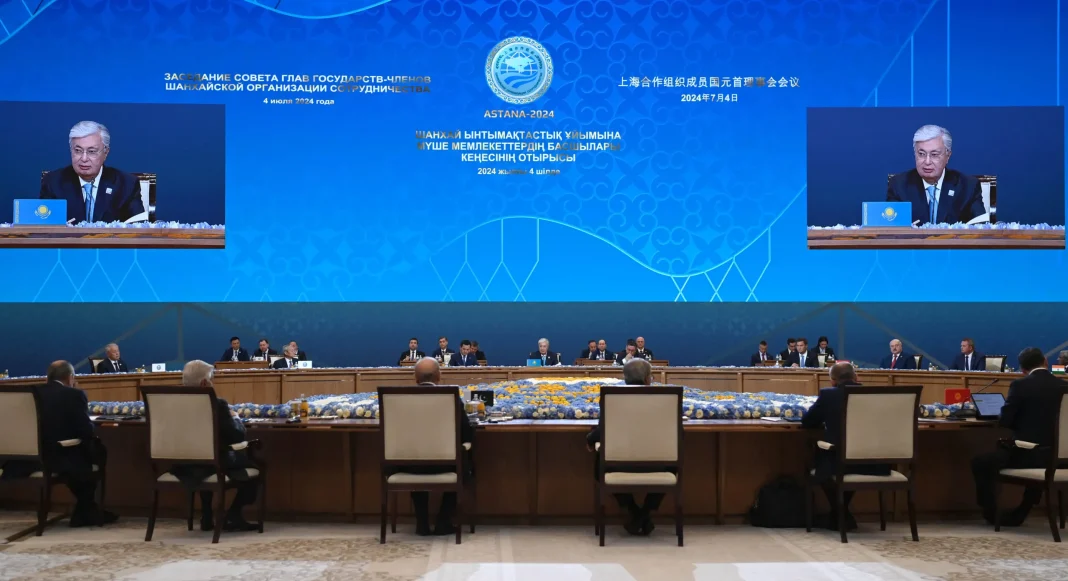This article was issued by The Astana Times.
ASTANA – As the 24th summit of the Shanghai Cooperation Organization (SCO) continues in Astana, experts reflect on the significance of the event in current geopolitical dynamics and Kazakhstan’s role as it concludes its chairmanship of the organization.
Kazakhstan took over the chairmanship from India in July 2023. Since then, the nation has organized over 150 events across various domains to address security, stability, and development within the now ten-member SCO.
The two-day summit adopted several key documents, including the Astana Declaration, the initiative on World Unity for Just Peace, Harmony, and Development proposed by Kazakhstan, the SCO Development Strategy until 2025, Cooperation Program to Counter Terrorism, Separatism and Extremism for 2025-2027, the Anti-Drug Strategy, and the Energy Cooperation Development Strategy.
Welcoming the leaders at the summit, President Kassym-Jomart Tokayev described the SCO as a “unique platform” that considers the voices of all its member states.
“The treaty base was enriched with 60 new documents, including the Anti-Drug Strategy, the Plan for the Implementation of the Economic Cooperation Strategy, the Agreement on Environmental Protection, and the Energy Cooperation Development Strategy. The range of SCO partner international organizations has been expanded. The activities of the Special Working Group on Investments were resumed. The process of transition to settlements in national currencies has gained positive momentum,” said Tokayev.
Bauyrzhan Auken, a chief expert at the Asian studies department of the Kazakhstan Institute for Strategic Studies, said Kazakhstan benefits from the SCO across all domains.
“Politically, membership in the Shanghai Cooperation Organization gives Kazakhstan a voice in international politics. In the current time of geopolitical turbulence, building diplomatic ties in a multilateral format is of particular importance for Kazakhstan to ensure and attract foreign investment,” Auken told The Astana Times.
Economically, it works towards boosting trade ties. According to data from the Kazakh government, Kazakhstan’s trade volume with SCO member states increased by 56.5% in five years, reaching $66 billion. In January-April 2024, the volume of trade within the organization hit $19.1 billion.
“Thanks to our country’s membership in the SCO, our businesses have the opportunity to export their goods. For example, if we take China, with the age of technology, Kazakhstan’s citizens can place their goods on China’s online platform. Last year, during the visit of our President, our pavilion was opened on the leading Chinese e-commerce platform, which is such a vivid example,” said Auken.
Strengthening security was one of the organization’s founding objectives, and this included addressing what is known as the three forces of evil—terrorism, extremism, and separatism. One of the major documents adopted at the Astana summit is the Cooperation Program to Counter Terrorism, Separatism, and Extremism for 2025-2027.
“During today’s summit, a strategy to counter drugs, more precisely drug trafficking, was adopted, which is also relevant for our state. It is of particular importance to ensure and prevent the spread of narcotic drugs among our population,” he added.
The SCO has a crucial role in bridging the East and West, with Kazakhstan’s presidency presenting an opportunity to address geoeconomic and geopolitical challenges, said Dipanjan Roy Chaudhury, a diplomatic editor at The Economic Times, an Indian English-language business-focused daily newspaper.
“The last time the SCO was held under the Kazakh presidency was in 2017. Since then, there have been a lot of geoeconomic and geopolitical challenges, with COVID-19 and wars in various parts of the world. As a growing multilateral organization, I think the SCO needs to deal with some of these challenges. President Tokayev has a good formula for using the SCO to bridge the East and the West, and I hope that will be successful,” he said in a comment for this story.
He noted that with Belarus joining the SCO, the organization now has a direct border with the European Union.
“That is also a healthy sign of connectivity. But I feel connectivity should not be limited to just one corridor. Connectivity has multiple corridors, and Kazakhstan is interested in both the East and West and North and South corridors. The North and South corridors help Kazakhstan and Central Asia connect with the Indian Ocean and India, which is one of the biggest countries in the Shanghai Cooperation Organization, with a large population and large market size. That brings a lot of diversity to the SCO, which is good for the spirit of the organization,” he said.
He underscored a “natural partnership” between India and the Eurasian countries, with the SCO fostering diversity and economic growth by connecting both regions.
Nikola Mikovic, a researcher and analyst based in Serbia, sees the summit as an opportunity for Kazakhstan, as a middle power, to strengthen its position in Central Asia and develop bilateral ties with each SCO member country.
“Kazakhstan seems to have a very constructive position, offering some significant steps that the organization should take. Unlike major powers that seem to pursue a policy of confrontation, Kazakhstan is actually promoting a peace agenda and diplomatic resolutions to conflicts. We will see if this approach will be adopted by those major powers, considering their own geopolitical interests,” he told The Astana Times.
Mikovic underlined the need for more economic projects within the SCO to increase the organization’s effectiveness. He also noted that geopolitical differences between member countries present an obstacle. “Kazakhstan is trying to balance between all those countries,” said Mikovic.
Original Link: https://astanatimes.com/2024/07/experts-reflect-on-kazakhstans-chairmanship-as-sco-summit-concludes-in-astana/


